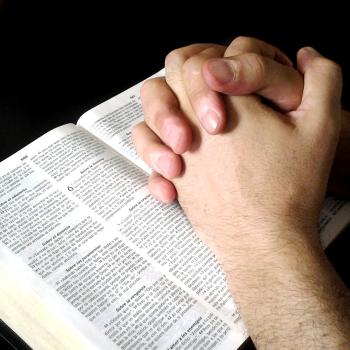As we begin, I have found that when I have taught on this topic over the years, one of the most common responses when people first encounter the idea of Christian non-violence is often frustration, if not outright anger and/or condemnation.
Ironically, this teaching, based in peace, can provoke a less-than-peaceful reaction!

Image via Pixabay
There is something about this idea that affect and challenge something deep within us – our sense of self-preservation, most likely, or also perhaps our cultural expectations of strength and power.
This teaching is also sometimes seen as an attack on those who view things differently – “Oh, so you’re saying that I’m not a good Christian if I want to serve my country in the army!” But it’s certainly not that either. I have friends and family who are believers and who have served in the military, and who serve in other roles like police officers or security, who have my deepest respect and appreciation.
This is an area where Christians may disagree, and so anyone engaging on either side of this discussion should acknowledge this first and foremost, without demonizing the other side.
We don’t get to lay aside our command to love one another just because we hold a different view on something; if anything, love compels us to disagree very carefully, thoughtfully, and graciously.
Christ-followers should not engage in violence, but should be active agents of peace, healing, and reconciliation instead – that is the simple premise of this key tenet of Anabaptism. Of course, volumes could be written on this topic, but here is a snapshot of why Anabaptists believe this:
- Jesus commanded us to love our enemies. The argument begins that simply. We are told to love our enemies, and that this act of enemy-love will mark us as children of our Father in Heaven (Mt 5.43-48). This being the case, how can we equate loving our enemies with harming or killing our enemies? Love simply doesn’t do that (Rom 13.10; 1Cor 13.7).
- Old Testament passages containing violence are of course biblical, but are actually irrelevant to the discussion. People often point to the many OT passages where violence exists or is even commanded as justification for Christian violence. But when Jesus arrived on earth, He announced, “The Kingdom of God is here!” (Mt 4.17). He was establishing His throne and His reign on the earth in a whole new way. This makes any violence we find in Scripture before His arrival irrelevant to the discussion, as the Kingdom of Heaven had not arrived on earth yet. The OT is revered as part of God’s Word, but Christ-followers are part of a different covenant than Israel was (Heb 8.13), and you won’t find New Covenant teaching that calls for, allows, or encourages violence.
- Jesus made clear that His Kingdom is not a typical worldly kingdom of worldly violence. As He was on trial before Pilate, Jesus said, “My kingdom is not of this world. If it were, my servants would fight to prevent my arrest by the Jewish leaders. But now my kingdom is from another place,” (Jn 18.36). Worldly kingdoms use violence to enforce their agendas and to enforce justice; the Kingdom of Heaven is holy, different than worldly kingdoms. As citizens of this Kingdom first and foremost (Phil 3.20), the ways of this Kingdom trump the ways of any earthly kingdom for the Christ-follower.
- Jesus warned that violence creates more violence. At His arrest, Jesus’ disciple Peter picks up a sword and starts swinging it to defend his Lord. He is swiftly and sharply rebuked by Jesus: “Put your sword back in its place, for all who draw the sword will die by the sword,” (Mt 26.52). We have seen it amongst both individuals and nations over and over again: Violence works in cycles of receiving and retaliation, and it has a way of perpetuating onwards, even if immediate threats might be neutralized. The violence of WWI eventually ended, but the ongoing effects of that conflict set the stage for the rise of Hitler and WWII. Violence indeed stopped Hitler, but then bled into the Cold War proxy conflicts all over the world. This set the stage for the rise of the Taliban in Afghanistan and the 9/ll attacks, which led to two more Middle Eastern wars, etc. The violence never really ends; even if it violence stops a threat, it often transfers. Christ-followers are called to break the cycle of retaliation, not actively participate in it (Mt 5.38-39).
- Jesus calls us to forgiveness, not vengeance. Much violence and destruction comes in retaliation for wrongs done against people, and while the instinct is understandable, Jesus teaches His followers not to act in such a way (Mt 6.14-15; 18.21-35). We are told to leave revenge in God’s hands (Rom 12.18-20), as He is a better judge than we are.
- Jesus’ command for His disciples to buy swords is misunderstood. It is often argued that since Jesus told his disciples at one point to buy swords (Lk 22.36-38), that therefore Jesus is OK at least with self-defense, if not offensive weapons. But if Jesus were seriously looking for them to use violence to defend themselves, why does He have the group of 12 only take two swords and not more, knowing that they are about be scattered, and why does He then rebuke Peter the moment that that he uses a sword in self-defense?
A key context of this passage easily gets missed: verse 37, which is a quotation of a prophecy about the Messiah from Isaiah 53.12, which Jesus uses to essentially say, “Get some swords, because this prophecy is about to be fulfilled: the Son of Man must be found amongst the transgressors.” Jesus never sinned, and up until that point, His followers couldn’t be considered a band of transgressors. Once Peter started swinging his sword at the authorities, the prophecy was fulfilled, and the Son of Man was indeed found amongst a group of transgressors, and arrested. The swords were needed to fulfill the prophecy, and not for actual violent use, as is made clear by Jesus’ rebuke when Peter engages in violence.
- The State may indeed need to engage in violence – but the Church is not the State. “Oh, so Hitler should just walk all over the world and kill everyone?!” Not at all. (Hitler is always the example used when this topic comes up!) Make no mistake, violence may certainly be needed at times in order to restrain evil, and God has appointed the sword to the State for this task (Rom 13.1-5). The important thing to note is that God has not appointed the sword to the Christ-follower for this task. Put simply: the State may use violence as a servant of God’s justice; the Christ-follower is not called to do the same. Nowhere in the teachings of Christ or His apostles do we get any idea that the Christ-follower is called to participate in violence – the Church has a different role than the State, and therefore the citizen of Heaven has a different responsibility before God than the citizen of the State.
- It is difficult, if not impossible, to carry the Gospel of grace and a sword at the same time. How can a Christ-follower say to an unbeliever, “God loves you, so do I, and He is calling you back to Himself!” while simultaneously acting violently against them? The Church has destroyed its witness in many places on earth over the centuries by causing much death and destruction, all in the Name of Jesus. Again, the Church has its mission: to proclaim the mercy of God through Christ to the world (Mt 28.18-20; 2Co 5.11-21). It is an awfully mixed message for Christ-followers to be tasked with sharing God’s love and mercy for His enemies (Rom 5.6-11) while also trying to harm their own enemies.
- Christ-followers are certainly called to resist and oppose evil – but in different ways. To be very clear: we do not “do nothing” in the face of evil, as critics of pacifism often unfairly attest. We just don’t do violence. We are told, “Do not be overcome by evil, but overcome evil with good” (Rom 12.21). Meeting evil with more evil is not the solution. “Pacifism” is often being replaced as a term by “Peacemaking” or similar terms, as for many people “pacifism” sounds like the word “passive” – inaction, letting evil flourish while sitting idly by. But nothing could be further from the truth. Pacifism seeks creative, active, self-sacrificing, loving, serving, life-giving and resisting action in the face of evil. If Christians are standing idly by while evil flourishes, we are failing dismally. Desmond Doss lays it out well here in the film Hacksaw Ridge – the Christ-follower cannot stand by and do nothing in the face of evil, but will seek good and godly ways to resist evil instead of destructive ways.
So, there’s the nutshell! If it’s new to you, and especially if you feel annoyance or anger rising up in you, my gentle advice would be to take a beat – don’t react yet. Just give it some time, let it settle, pray into it.
This is an area where Christians disagree, and you are free to do so here, and that doesn’t ever need to be a problem, as long as it is done respectfully, and in love. I am an Anabaptist pastor of an Anabaptist church and this is an Anabaptist column at Patheos. The reader should not be surprised at all to hear Anabaptist thoughts presented here!
And if you disagree, so be it! If you love, worship, and serve Jesus, then we are all on the same team, and we can love each other all the same.
********
If you’re enjoying what you read, you can follow Third Way Christians on Facebook or Instagram, or sign up to get new columns emailed to you here! As well, you can track along with Chris’ church teaching at Meadow Brook Church’s YouTube page!
















